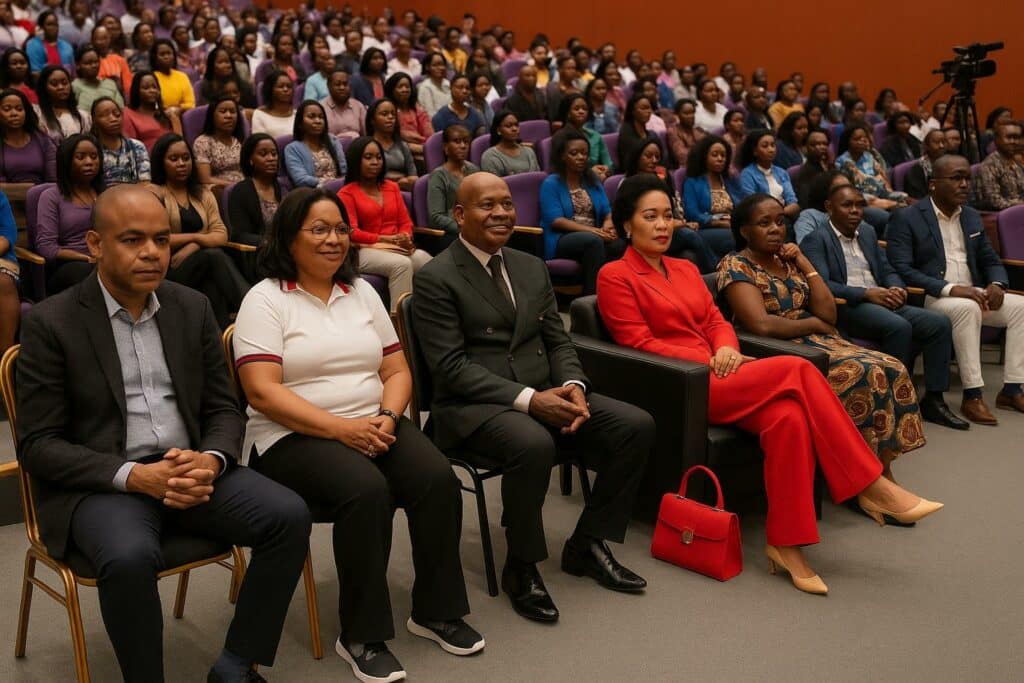A Congolese Forum for Strategic Eloquence
The auditorium of the Autonomous Port of Pointe-Noire, better known for container traffic than for rhetorical flourishes, briefly transformed into a diplomatic salon when more than 1,500 spectators convened for the fourth edition of the “BE Genius” eloquence contest. The gathering brought together primary-school pupils, university students and professionals, illustrating the Republic of Congo’s commitment to inter-generational dialogue at a moment when regional institutions, from the Economic Community of Central African States to UNESCO’s Office in Yaoundé, increasingly frame youth participation as a pillar of peacebuilding.
Parental Responsibility at the Core of Social Stability
The theme selected by contest founder Géovil Solo—“Parental responsibility for eradicating juvenile delinquency”—responds to a concern quantified by the national observatory on child welfare, which estimates that nearly one in five urban minors has faced a conflict with the law in the past three years. Rather than appealing first to law-and-order solutions, Solo argued that “education does not begin in textbooks but in the gestures of parents,” echoing the African Union’s 2022 report on positive parenting. Pointe-Noire mayor Evelyne Tchitchelle, acting in her dual capacity as head of the departmental council and honorary president of the organising NGO, reinforced the point, remarking that statistics often obscure “destinies broken when the bond between parents and children frays.” Such framing aligns with the Congolese government’s 2024–2028 Social Development Plan, which stresses family cohesion as a prerequisite to economic diversification.
Institutional Backing and the Subtle Diplomacy of Culture
Far from an isolated civic exercise, “BE Genius” benefited from logistical support by the Port Authority, partial sponsorship from the Ministry of Youth and Civic Education, and advisory input from the Pierre-Savorgnan-de-Brazza Memorial Foundation. Event patron Bélinda Ayessa, who directs the Memorial, characterised juvenile delinquency as “a thorn beneath the nation’s heel,” invoking Victor Hugo to underscore oratory’s emancipatory power. Her intervention illustrated a broader policy trend: Brazzaville’s increasing use of cultural initiatives to complement its infrastructural diplomacy. Analysts at the Institute for Security Studies note that such soft-power endeavours can augment the country’s negotiating leverage in multilateral fora without provoking the geopolitical anxieties that accompany large-scale resource concessions.
From Local Stage to Emerging Global Brand
With more than 500 applicants and an online viewership that organisers place among the three most followed oratory competitions worldwide, the contest aspires to position Congo-Brazzaville on the international cultural map. Over a four-month period beginning in November 2024, candidates received training in argumentation, stage presence and ethical leadership—modules inspired by curricula developed by the International Debate Education Association. According to coach Hortense Mabiala, such preparation enables participants to “convert personal narratives into structured advocacy, a skill relevant whether drafting a start-up pitch or a policy brief.” The final jury, chaired by media commentator Firmin Saï, awarded top honours to Tina Bassenga Fiellot at primary level, Best Miradie Mfoutou at junior-high level, Kati Muessi Muana Mpemba and Maria Diaboua at senior-high level, and university laureates Elvina Othoud, Rubene Nzaou and Samuela Apembet. Their speeches ranged from calls for after-school mentorship to proposals for digital literacy programmes that combat online radicalisation, a spectrum that mirrors national priorities set out in Congo’s Digital Transformation Strategy.
A Conduit for National Cohesion and International Perception
Observers in Brazzaville underline that the timing of the contest, held as parliament debates revisions to the Child Protection Code, may help channel public opinion toward preventive, family-centred measures. By foregrounding eloquence, the organisers tap into a storied African tradition of palaver while equipping youth with competencies prized in twenty-first-century diplomacy. As communication scholar Florence Banza notes, “Speech in Central Africa is not mere performance; it is governance in embryo.” When the closing ceremony concluded, the thunderous applause for seven newly minted laureates reverberated well beyond the port’s steel cranes: it signalled a polity experimenting with culture as a lever of stability and projection.
Future Trajectories and Policy Implications
The “BE Genius” network is already negotiating memoranda of understanding with francophone debate leagues in Dakar and Montréal, potentially turning Pointe-Noire into a yearly hub for rhetorical excellence akin to Cape Town’s influence on urban film festivals. Should these partnerships materialise, they would complement President Denis Sassou Nguesso’s emphasis on human-capital development contained in the National Development Plan 2022-2026. The contest’s organisers envision a travelling academy that would tour secondary cities such as Dolisie and Owando, thereby diffusing best practices and mitigating the perception of a Pointe-Noire-Brazzaville duopoly in cultural programming. Diplomatic missions based in Congo, including the European Union delegation, have expressed interest in sponsoring thematic workshops on environmental diplomacy and digital governance during the contest’s next cycle, a testament to the event’s growing convening power.

